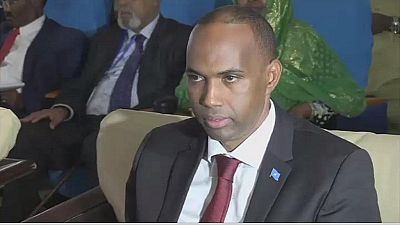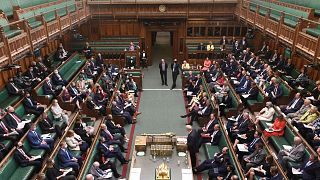Somalie
WASHINGTON — Congress is starting the new year right where they ended the old one — far apart on finding agreement on a government funding bill and a solution for the children of undocumented immigrants whose residency status is currently in limbo. And the deadline clock continues to tick away.
Before Congress left town for the holidays, they gave themselves until Jan. 19 to reach a deal on government funding levels, disaster aid and the children's health insurance program known as CHIP. But those already difficult negotiations have been complicated even more by a wide gap between the parties on resolving DACA, or Deferred Action for Child Arrivals, the Obama-era program that allowed young people who were brought to the United States illegally as children to remain in the country.
Congressional leaders from both parties were huddled Wednesday afternoon to discuss those issues as the rest of their colleagues trickled back to town. House Speaker Paul Ryan, House Minority Leader Nancy Pelosi, Senate Majority Leader Mitch McConnell and Senate Minority Leader Chuck Schumer met with Marc Short, the White House legislative affairs director, and Mike Mulvaney, the White House budget director, to continue discussions that have been ongoing for at least two months with little public signs of progress.
"We had a positive and productive meeting and all parties have agreed to continue discussing a path forward to quickly resolve all of the issues ahead of us," Pelosi and Schumer said in a joint statement after the meeting.
A statement released by the Republicans sounded mores pessimistic and less willing to negotiate on immigration.
"It also remains important that members of Congress do not hold funding for our troops hostage for immigration policy," the White House, Ryan and McConnell wrote in their statement leaving the meeting. "We've been clear about these budget priorities from the beginning and hope that further discussions will lead to an agreement soon."
While they can kick the can down the road again and pass a third short-term measure to give them more time to fund the government for the remainder of the fiscal year, incremental funding is not preferable for most every member of Congress. And the Defense Department is strongly urging against it, saying it harms military readiness.
President Donald Trump set the deadline to address DACA for March, and while he could extend it, that would set up a sea of uncertainty for the Dreamers (as the program's recipients are known), their employers and the agency that has to process the paperwork. And neither Republicans nor Democrats want to keep this issue on the burner as they approach the midterm elections.
Republicans are seeking a break in the so-called sequester — a yearly cap on all spending levels — in favor of a $54 billion increase in defense spending. Democrats are asking for an equivalent increase in nondefense domestic spending in return.
With just a little more than two weeks until the deadline, the possibility of a government shutdown appears to be greater than at any other time in the past six months because of the impasse over immigration.
Democrats are demanding a path to citizenship for the immigrants brought to the U.S. as children.
"We are firmly committed to swiftly passing the DREAM Act, which we know would pass with bipartisan support if brought to the Floor," Pelosi wrote to her Democratic colleagues in the House on Tuesday.
Trump is demanding that money for a border wall be part of any immigration deal and Republicans say that DACA should not be negotiated as part of a large spending package but on its own.
Furthermore, Democrats won't agree to set aside money for a wall or interior enforcement but have said that paying for border security is acceptable. And they say that issues of family migration and the diversity lottery can be discussed within the context of comprehensive immigration reform but not as part of this deal.














01:17
La Turquie et la Somalie renforcent leurs liens stratégiques
01:49
Kenya : des commerces pillés après les manifestations à Nairobi
01:05
Afrique du Sud : un an après, la coalition gouvernementale à couteaux tirés
01:09
Soudan : les paramilitaires nomment un gouvernement parallèle
01:07
Mozambique : au moins 120 enfants enlevés par des djihadistes
01:15
Kenya : 30 ans de prison pour les complices de l'attentat de 2019